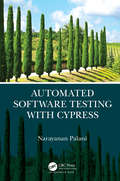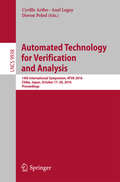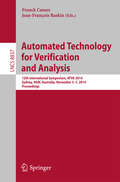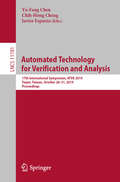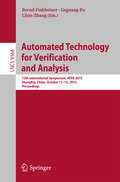- Table View
- List View
Automated Security Management
by Ehab Al-Shaer, Xinming Ou and Geoffrey XieIn this contributed volume, leading international researchers explore configuration modeling and checking, vulnerability and risk assessment, configuration analysis, and diagnostics and discovery. The authors equip readers to understand automated security management systems and techniques that increase overall network assurability and usability. These constantly changing networks defend against cyber attacks by integrating hundreds of security devices such as firewalls, IPSec gateways, IDS/IPS, authentication servers, authorization/RBAC servers, and crypto systems. Automated Security Management presents a number of topics in the area of configuration automation. Early in the book, the chapter authors introduce modeling and validation of configurations based on high-level requirements and discuss how to manage the security risk as a result of configuration settings of network systems. Later chapters delve into the concept of configuration analysis and why it is important in ensuring the security and functionality of a properly configured system. The book concludes with ways to identify problems when things go wrong and more. A wide range of theoretical and practical content make this volume valuable for researchers and professionals who work with network systems.
Automated Software and Service Composition: A Survey and Evaluating Review (SpringerBriefs in Computer Science)
by Felix MohrThis book is by far the most systematic and comprehensive review of the field of automated software composition. Based on a formally described and reproducible methodology, it critically discusses the approaches, which are relevant for experts interested in an organized overview of related work. It also provides an introduction and intuitive classification system for researchers new to the field.In order to create this survey, several dozen papers were analyzed with respect to the concrete problems they tackle and the proposed solutions. It delivers both an overview and a qualitative comparison of the approaches, and answers three research questions: What types of automated software composition problems exist? In which use cases do these problems typically occur? And what are the most prominent solution paradigms for the different types? Overall, this book saves a great deal of time for everyone pursuing research in the area of automated software composition who needs a comprehensive guide that helps them understand the field, and that relates new approaches to existing ones.
Automated Software Diversity (Synthesis Lectures on Information Security, Privacy, and Trust)
by Per Larsen Stefan Brunthaler Lucas Davi Ahmad-Reza SadeghiWhereas user-facing applications are often written in modern languages, the firmware, operating system, support libraries, and virtual machines that underpin just about any modern computer system are still written in low-level languages that value flexibility and performance over convenience and safety. Programming errors in low-level code are often exploitable and can, in the worst case, give adversaries unfettered access to the compromised host system. This book provides an introduction to and overview of automatic software diversity techniques that, in one way or another, use randomization to greatly increase the difficulty of exploiting the vast amounts of low-level code in existence. Diversity-based defenses are motivated by the observation that a single attack will fail against multiple targets with unique attack surfaces. We introduce the many, often complementary, ways that one can diversify attack surfaces and provide an accessible guide to more than two decades worth of research on the topic. We also discuss techniques used in conjunction with diversity to prevent accidental disclosure of randomized program aspects and present an in-depth case study of one of our own diversification solutions.
Automated Software Engineering: A Deep Learning-Based Approach (Learning and Analytics in Intelligent Systems #8)
by Suresh Chandra Satapathy Ajay Kumar Jena Jagannath Singh Saurabh BilgaiyanThis book discusses various open issues in software engineering, such as the efficiency of automated testing techniques, predictions for cost estimation, data processing, and automatic code generation. Many traditional techniques are available for addressing these problems. But, with the rapid changes in software development, they often prove to be outdated or incapable of handling the software’s complexity. Hence, many previously used methods are proving insufficient to solve the problems now arising in software development. The book highlights a number of unique problems and effective solutions that reflect the state-of-the-art in software engineering. Deep learning is the latest computing technique, and is now gaining popularity in various fields of software engineering. This book explores new trends and experiments that have yielded promising solutions to current challenges in software engineering. As such, it offers a valuable reference guide for a broad audience including systems analysts, software engineers, researchers, graduate students and professors engaged in teaching software engineering.
Automated Software Testing: Foundations, Applications and Challenges (Services and Business Process Reengineering)
by Ajay Kumar Jena Himansu Das Durga Prasad MohapatraThis book covers both theory and applications in the automation of software testing tools and techniques for various types of software (e.g. object-oriented, aspect-oriented, and web-based software). When software fails, it is most often due to lack of proper and thorough testing, an aspect that is even more acute for object-oriented, aspect-oriented, and web-based software. Further, since it is more difficult to test distributed and service-oriented architecture-based applications, there is a pressing need to discuss the latest developments in automated software testing. This book discusses the most relevant issues, models, tools, challenges, and applications in automated software testing. Further, it brings together academic researchers, scientists, and engineers from a wide range of industrial application areas, who present their latest findings and identify future challenges in this fledging research area.
Automated Software Testing with Cypress
by Narayanan PalaniUnit Integration Testing (UIT) had been a challenge because there was no tool that could help in XHR programming and unit integration validations in an efficient way until Cypress arrived. Cypress started releasing versions in 2015 and became popular in 2018 with version 2.0.0. This book explores Cypress scripts that help implement ‘shift left testing’, which is a dream come true for many software testers. Shift left occurs in the majority of testing projects, but could not be implemented fully because tools were unavailable and knowledge was lacking about the possibilities of testing early in the life cycle. Shift left is a key testing strategy to help testing teams focus less on defect identifications and more on developing practices to prevent defects. Cypress scripts can help front-end developers and quality engineers to work together to find defects soon after web components are built. These components can be tested immediately after they are built with Cypress Test Driven Development (TDD) scripts. Thus, defects can be fixed straight away during the development stage. Testing teams do not have to worry about finding these same defects in a later development stage because Cypress tests keep verifying components in the later stages. Defect fixing has become much cheaper with Cypress than when other tools are used. The book also covers Behaviour Driven Development (BDD)-based Gherkin scripts and the Cypress Cucumber preprocessor, which can improve test scenario coverage. Automated Software Testing with Cypress is written to fulfil the BDD and TDD needs of testing teams. Two distinct open source repositories are provided in Github to help start running Cypress tests in no time!
Automated Software Testing with Cypress
by Narayanan PalaniUnit Integration Testing (UIT) had been a challenge because there was no tool that could help in XHR programming and unit integration validations in an efficient way until Cypress arrived. Cypress started releasing versions in 2015 and became popular in 2018 with version 2.0.0. This book explores Cypress scripts that help implement ‘shift left testing’, which is a dream come true for many software testers. Shift left occurs in the majority of testing projects, but could not be implemented fully because tools were unavailable and knowledge was lacking about the possibilities of testing early in the life cycle. Shift left is a key testing strategy to help testing teams focus less on defect identifications and more on developing practices to prevent defects. Cypress scripts can help front-end developers and quality engineers to work together to find defects soon after web components are built. These components can be tested immediately after they are built with Cypress Test Driven Development (TDD) scripts. Thus, defects can be fixed straight away during the development stage. Testing teams do not have to worry about finding these same defects in a later development stage because Cypress tests keep verifying components in the later stages. Defect fixing has become much cheaper with Cypress than when other tools are used. The book also covers Behaviour Driven Development (BDD)-based Gherkin scripts and the Cypress Cucumber preprocessor, which can improve test scenario coverage. Automated Software Testing with Cypress is written to fulfil the BDD and TDD needs of testing teams. Two distinct open source repositories are provided in Github to help start running Cypress tests in no time!
Automated Solution of Differential Equations by the Finite Element Method: The FEniCS Book (Lecture Notes in Computational Science and Engineering #84)
by Anders Logg Kent-Andre Mardal Garth WellsThis book is a tutorial written by researchers and developers behind the FEniCS Project and explores an advanced, expressive approach to the development of mathematical software. The presentation spans mathematical background, software design and the use of FEniCS in applications. Theoretical aspects are complemented with computer code which is available as free/open source software. The book begins with a special introductory tutorial for beginners. Following are chapters in Part I addressing fundamental aspects of the approach to automating the creation of finite element solvers. Chapters in Part II address the design and implementation of the FEnicS software. Chapters in Part III present the application of FEniCS to a wide range of applications, including fluid flow, solid mechanics, electromagnetics and geophysics.
Automated Taxonomy Discovery and Exploration (Synthesis Lectures on Data Mining and Knowledge Discovery)
by Jiaming Shen Jiawei HanThis book provides a principled data-driven framework that progressively constructs, enriches, and applies taxonomies without leveraging massive human annotated data. Traditionally, people construct domain-specific taxonomies by extensive manual curations, which is time-consuming and costly. In today’s information era, people are inundated with the vast amounts of text data. Despite their usefulness, people haven’t yet exploited the full power of taxonomies due to the heavy curation needed for creating and maintaining them. To bridge this gap, the authors discuss automated taxonomy discovery and exploration, with an emphasis on label-efficient machine learning methods and their real-world usages. Taxonomy organizes entities and concepts in a hierarchy way. It is ubiquitous in our daily life, ranging from product taxonomies used by online retailers, topic taxonomies deployed by news outlets and social media, as well as scientific taxonomies deployed by digital libraries across various domains. When properly analyzed, these taxonomies can play a vital role for science, engineering, business intelligence, policy design, e-commerce, and more. Intuitive examples are used throughout enabling readers to grasp concepts more easily.
Automated Technology for Verification and Analysis: 21st International Symposium, ATVA 2023, Singapore, October 24–27, 2023, Proceedings, Part II (Lecture Notes in Computer Science #14216)
by Étienne André Jun SunThis book constitutes the refereed proceedings of the 21st International Symposium on Automated Technology for Verification and Analysis, ATVA 2023, held in Singapore, in October 2023. The symposium intends to promote research in theoretical and practical aspects of automated analysis, verification and synthesis by providing a forum for interaction between regional and international research communities and industry in related areas. The 30 regular papers presented together with 7 tool papers were carefully reviewed and selected from 150 submissions.The papers are divided into the following topical sub-headings: Temporal logics, Data structures and heuristics, Verification of programs and hardware.
Automated Technology for Verification and Analysis: 21st International Symposium, ATVA 2023, Singapore, October 24–27, 2023, Proceedings, Part I (Lecture Notes in Computer Science #14215)
by Étienne André Jun SunThis book constitutes the refereed proceedings of the 21st International Symposium on Automated Technology for Verification and Analysis, ATVA 2023, held in Singapore, in October 2023. The symposium intends to promote research in theoretical and practical aspects of automated analysis, verification and synthesis by providing a forum for interaction between regional and international research communities and industry in related areas. The 30 regular papers presented together with 7 tool papers were carefully reviewed and selected from 150 submissions.The papers are divided into the following topical sub-headings: Temporal logics, Data structures and heuristics, Verification of programs and hardware.
Automated Technology for Verification and Analysis: 14th International Symposium, ATVA 2016, Chiba, Japan, October 17-20, 2016, Proceedings (Lecture Notes in Computer Science #9938)
by Cyrille Artho Axel Legay Doron PeledThis book constitutes the proceedings of the 14th International Symposium on Automated Technology for Verification and Analysis, ATVA 2016, held in Chiba, Japan, in October 2016.The 31 papers presented in this volume were carefully reviewed and selected from 82 submissions. They were organized in topical sections named: keynote; Markov models, chains, and decision processes; counter systems, automata; parallelism, concurrency; complexity, decidability; synthesis, refinement; optimization, heuristics, partial-order reductions; solving procedures, model checking; and program analysis.
Automated Technology for Verification and Analysis: 8th International Symposium, ATVA 2010, Singapore, September 21-24, 2010, Proceedings (Lecture Notes in Computer Science #6252)
by Ahmed Bouajjani Wei-Ngan ChinAutomated Technology for Verification and Analysis: 20th International Symposium, ATVA 2022, Virtual Event, October 25–28, 2022, Proceedings (Lecture Notes in Computer Science #13505)
by Ahmed Bouajjani Lukáš Holík Zhilin WuThis book constitutes the refereed proceedings of the 20th International Symposium on Automated Technology for Verification and Analysis, ATVA 2022, held in Beiging, China in October 2022. The symposium is dedicated to promoting research in theoretical and practical aspects of automated analysis, verification and synthesis by providing an international venue for the researchers to present new results. The 21 regular papers presented together with 5 tool papers and 1 invited paper were carefully reviewed and selected from 81 submissions.The papers are divided into the following topical sub-headings: reinforcement learning; program analysis and verification; smt and verification; automata and applications; active learning; probabilistic and stochastic systems; synthesis and repair; and verification of neural networks.
Automated Technology for Verification and Analysis: 9th International Symposium, ATVA 2011, Taipei, Taiwan, October 11-14, 2011, Proceedings (Lecture Notes in Computer Science #6996)
by Tevfik Bultan Pao-Ann HsiungThis book constitutes the refereed proceedings of the 9th International Symposium on Automated Technology for Verification and Analysis, ATVA 2011, held in Taipei, Taiwan, in October 2011.The 23 revised regular papers presented together with 5 invited papers, 11 short papers, and 2 tool papers, were carefully reviewed and selected from 75 submissions. The papers address all theoretical and practical aspects of automated analysis, verification and synthesis; thus providing a forum for interaction between the regional and the international research communities and industry in the field.
Automated Technology for Verification and Analysis: 12th International Symposium, ATVA 2014, Sydney, Australia, November 3-7, 2014, Proceedings (Lecture Notes in Computer Science #8837)
by Franck Cassez Jean-François RaskinThis book constitutes the proceedings of the 12th International Symposium on Automated Technology for Verification and Analysis, ATVA 2014, held in Sydney, Australia, in November 2014.The 29 revised papers presented in this volume were carefully reviewed and selected from 76 submissions. They show current research on theoretical and practical aspects of automated analysis, verification and synthesis by providing an international forum for interaction among the researchers in academia and industry.
Automated Technology for Verification and Analysis: 6th International Symposium, ATVA 2008, Seoul, Korea, October 20-23, 2008, Proceedings (Lecture Notes in Computer Science #5311)
by Sungdeok Cha Jin-Young Choi Moonzoo Kim Mahesh ViswanathanThis book constitutes the refereed proceedings of the 6th International Symposium on Automated Technology for Verification and Analysis, ATVA 2008, held in Seoul, Korea, in October 2008. The 21 revised full papers 5 short papers and 7 tool papers presented together with 3 invited talks were carefully reviewed and selected from 82 submissions. The focos lies on theoretical methods to achieve correct software or hardware systems, including both functional and non functional aspects; as well as on applications of theory in engineering methods and particular domains and handling of practical problems occurring in tools. The papers are organized in topical sections on model checking, software verification, decision procedures, linear-time analysis, tool demonstration papers, timed and stochastic systems, theory, and short papers.
Automated Technology for Verification and Analysis: 17th International Symposium, ATVA 2019, Taipei, Taiwan, October 28–31, 2019, Proceedings (Lecture Notes in Computer Science #11781)
by Yu-Fang Chen Chih-Hong Cheng Javier EsparzaThis book constitutes the refereed proceedings of the 17th International Symposium on Automated Technology for Verification and Analysis, ATVA 2019, held in Taipei, Taiwan in October 2019.The 24 regular papers presented together with 3 tool papers were carefully reviewed and selected from 65 submissions. The symposium is dedicated to the promotion of research on theoretical and practical aspects of automated analysis, verification and synthesis by providing a forum for interaction between the regional and the international research communities and industry in the field. The papers focus on cyber-physical systems; runtime techniques; testing; automata; synthesis; stochastic systems and model checking.
Automated Technology for Verification and Analysis: 15th International Symposium, ATVA 2017, Pune, India, October 3–6, 2017, Proceedings (Lecture Notes in Computer Science #10482)
by Deepak D'Souza K. Narayan KumarThis book constitutes the refereed proceedings of the 15th International Symposium on Automated Technology for Verification and Analysis, ATVA 2017, held in Pune, India, in October 2017. The 22 full and 7 short papers presented in this volume were carefully reviewed and selected from 78 submissions. The book also contains one invited talk in full-paper length. The contributions are organized in topical sections named: program analysis; model checking and temporal logics; neural networks; learning and invariant synthesis; and hybrid systems and control.
Automated Technology for Verification and Analysis: 13th International Symposium, ATVA 2015, Shanghai, China, October 12-15, 2015, Proceedings (Lecture Notes in Computer Science #9364)
by Bernd Finkbeiner Geguang Pu Lijun ZhangThis book constitutes the proceedings of the 13th International Symposium on Automated Technology for Verification and Analysis, ATVA 2015, held in Shanghai, China, in October 2015. The 27 revised papers presented together with 6 tool papers in this volume were carefully reviewed and selected from 95 submissions. They show current research on theoretical and practical aspects of automated analysis, verification and synthesis by providing an international forum for interaction among the researchers in academia and industry.
Automated Technology for Verification and Analysis: 4th International Symposium, ATVA 2006, Beijing, China, October 23-26, 2006, Proceedings (Lecture Notes in Computer Science #4218)
by Susanne Graf Wenhui ZhangThis book constitutes the refereed proceedings of the Third International Symposium on Automated Technology for Verification and Analysis, ATVA 2006, held in Beijing, China in October 2006. The 35 revised full papers presented together with abstracts of three keynote papers were carefully reviewed and selected from 137 submissions.
Automated Technology for Verification and Analysis: 19th International Symposium, ATVA 2021, Gold Coast, QLD, Australia, October 18–22, 2021, Proceedings (Lecture Notes in Computer Science #12971)
by Zhe Hou Vijay GaneshThis book constitutes the refereed proceedings of the 19th International Symposium on Automated Technology for Verification and Analysis, ATVA 2021, held in Gold Coast, Australia in October 2021. The symposium is dedicated to promoting research in theoretical and practical aspects of automated analysis, verification and synthesis by providing an international venue for the researchers to present new results. The 19 regular papers presented together with 4 tool papers and 1 invited paper were carefully reviewed and selected from 75 submissions. The papers are divided into the following topical sub-headings: Automata Theory; Machine learning for Formal Methods; Theorem Proving and Tools; Model Checking; Probabilistic Analysis; Software and Hardware Verification; System Synthesis and Approximation; and Verification of Machine Learning.
Automated Technology for Verification and Analysis: 11th International Symposium, ATVA 2013, Hanoi, Vietnam, October 15-18, 2013, Proceedings (Lecture Notes in Computer Science #8172)
by Dang Van Hung Mizuhito OgawaThis book constitutes the refereed proceedings of the 11th International Symposium on Automated Technology for Verification and Analysis, ATVA 2013, held at Hanoi, Vietnam, in October 2013. The 27 regular papers, 3 short papers and 12 tool papers presented together with 3 invited talks were carefully selected from73 submissions. The papers are organized in topical, sections on analysis and verification of hardware circuits, systems-on-chip and embedded systems, analysis of real-time, hybrid, priced/weighted and probabilistic systems, deductive, algorithmic, compositional, and abstraction/refinement techniques for analysis and verification, analytical techniques for safety, security, and dependability, testing and runtime analysis based on verification technology, analysis and verification of parallel and concurrent hardware/software systems, verification in industrial practice, and applications and case studies.
Automated Technology for Verification and Analysis: 18th International Symposium, ATVA 2020, Hanoi, Vietnam, October 19–23, 2020, Proceedings (Lecture Notes in Computer Science #12302)
by Dang Van Hung Oleg SokolskyThis book constitutes the refereed proceedings of the 18th International Symposium on Automated Technology for Verification and Analysis, ATVA 2020, held in Hanoi, Vietnam, in October 2020. The 27 regular papers presented together with 5 tool papers and 2 invited papers were carefully reviewed and selected from 75 submissions. The symposium is dedicated to promoting research in theoretical and practical aspects of automated analysis, verification and synthesis by providing an international venue for the researchers to present new results. The papers focus on neural networks and machine learning; automata; logics; techniques for verification, analysis and testing; model checking and decision procedures; synthesis; and randomization and probabilistic systems.
Automated Technology for Verification and Analysis: 16th International Symposium, ATVA 2018, Los Angeles, CA, USA, October 7-10, 2018, Proceedings (Lecture Notes in Computer Science #11138)
by Shuvendu K. Lahiri Chao WangThis book constitutes the refereed proceedings of the 24th International Symposium on Automated Technology for Verification and Analysis, ATVA 2018, held in Los Angeles, CA, USA in October 2018.The 27 full papers presented together with 5 short papers and 3 invited talks were carefully reviewed and selected from 82 submissions. The symposium is dedicated to the promotion of research on theoretical and practical aspects of automated analysis, verification and synthesis by providing a forum for interaction between the regional and the international research communities and industry in the field.





